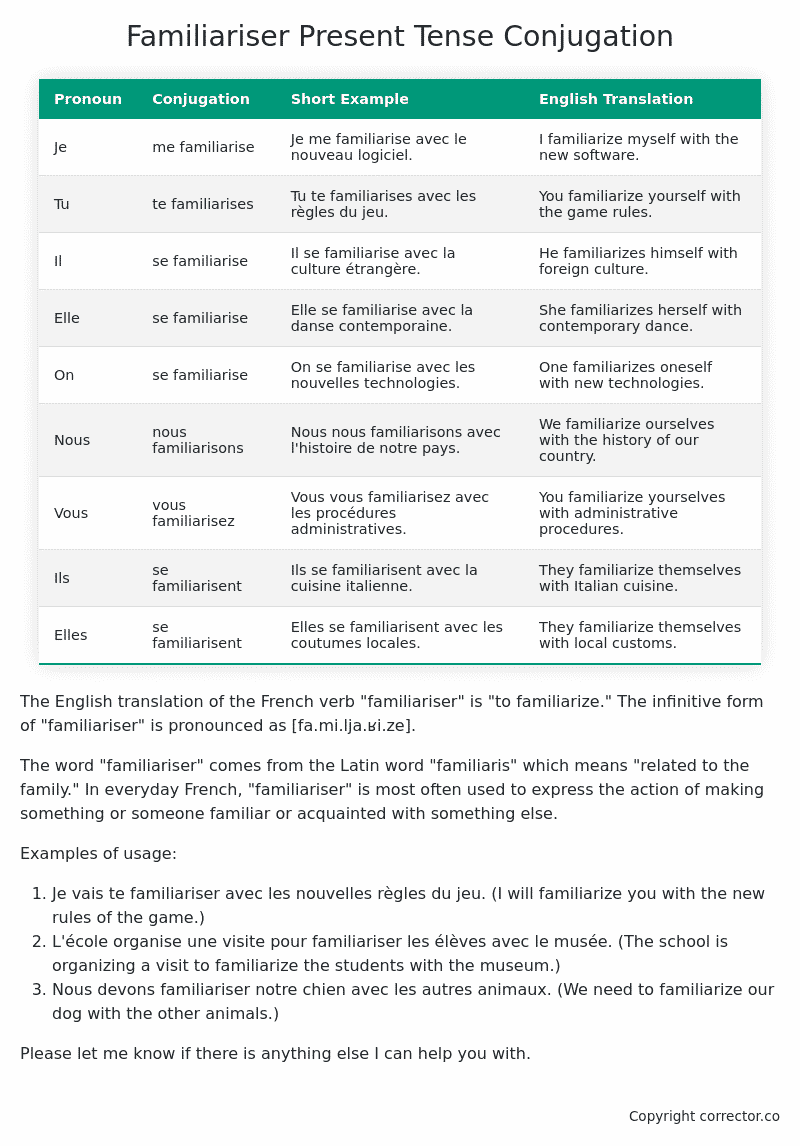Le Present (Present Tense) Conjugation of the French Verb familiariser
Introduction to the verb familiariser
The English translation of the French verb “familiariser” is “to familiarize.” The infinitive form of “familiariser” is pronounced as [fa.mi.lja.ʁi.ze].
The word “familiariser” comes from the Latin word “familiaris” which means “related to the family.” In everyday French, “familiariser” is most often used to express the action of making something or someone familiar or acquainted with something else.
Examples of usage:
- Je vais te familiariser avec les nouvelles règles du jeu. (I will familiarize you with the new rules of the game.)
- L’école organise une visite pour familiariser les élèves avec le musée. (The school is organizing a visit to familiarize the students with the museum.)
- Nous devons familiariser notre chien avec les autres animaux. (We need to familiarize our dog with the other animals.)
Please let me know if there is anything else I can help you with.
Familiariser – About the French Present Tense
To take a deep dive into all the French tenses then see our article on Mastering French Tense Conjugation.
Common Everyday Usage Patterns For Le Present
Interactions with Other Tenses
Table of the Present Tense Conjugation of familiariser
| Pronoun | Conjugation | Short Example | English Translation |
|---|---|---|---|
| Je | me familiarise | Je me familiarise avec le nouveau logiciel. | I familiarize myself with the new software. |
| Tu | te familiarises | Tu te familiarises avec les règles du jeu. | You familiarize yourself with the game rules. |
| Il | se familiarise | Il se familiarise avec la culture étrangère. | He familiarizes himself with foreign culture. |
| Elle | se familiarise | Elle se familiarise avec la danse contemporaine. | She familiarizes herself with contemporary dance. |
| On | se familiarise | On se familiarise avec les nouvelles technologies. | One familiarizes oneself with new technologies. |
| Nous | nous familiarisons | Nous nous familiarisons avec l’histoire de notre pays. | We familiarize ourselves with the history of our country. |
| Vous | vous familiarisez | Vous vous familiarisez avec les procédures administratives. | You familiarize yourselves with administrative procedures. |
| Ils | se familiarisent | Ils se familiarisent avec la cuisine italienne. | They familiarize themselves with Italian cuisine. |
| Elles | se familiarisent | Elles se familiarisent avec les coutumes locales. | They familiarize themselves with local customs. |
Other Conjugations for Familiariser.
Le Present (Present Tense) Conjugation of the French Verb familiariser (You’re reading it right now!)
Imparfait (Imperfect) Tense Conjugation of the French Verb familiariser
Passé Simple (Simple Past) Tense Conjugation of the French Verb familiariser
Passé Composé (Present Perfect) Tense Conjugation of the French Verb familiariser
Futur Simple (Simple Future) Tense Conjugation of the French Verb familiariser
Futur Proche (Near Future) Tense Conjugation of the French Verb familiariser
Plus-que-parfait (Pluperfect) Tense Conjugation of the French Verb familiariser
Passé Antérieur (Past Anterior) Tense Conjugation of the French Verb familiariser
Futur Antérieur (Future Anterior) Tense Conjugation of the French Verb familiariser
Subjonctif Présent (Subjunctive Present) Tense Conjugation of the French Verb familiariser
Subjonctif Passé (Subjunctive Past) Tense Conjugation of the French Verb familiariser
Subjonctif Imparfait (Subjunctive Imperfect) Tense Conjugation of the French Verb familiariser
Conditionnel Présent (Conditional Present) Tense Conjugation of the French Verb familiariser
Conditionnel Passé (Conditional Past) Tense Conjugation of the French Verb familiariser
Conditionnel Passé II (Conditional Past II) Tense Conjugation of the French Verb familiariser
L’impératif Présent (Imperative Present) Tense Conjugation of the French Verb familiariser
L’impératif Passé (Imperative Past) Tense Conjugation of the French Verb familiariser
L’infinitif Présent (Infinitive Present) Tense Conjugation of the French Verb familiariser
L’infinitif Passé (Infinitive Past) Tense Conjugation of the French Verb familiariser
Le Participe Présent (Present Participle) Tense Conjugation of the French Verb familiariser
Le Participe Passé (Past Participle) Tense Conjugation of the French Verb familiariser
Struggling with French verbs or the language in general? Why not use our free French Grammar Checker – no registration required!
Get a FREE Download Study Sheet of this Conjugation 🔥
Simply right click the image below, click “save image” and get your free reference for the familiariser present tense conjugation!

I hope you enjoyed this article on the verb familiariser. Still in a learning mood? Check out another TOTALLY random French verb present conjugation!


